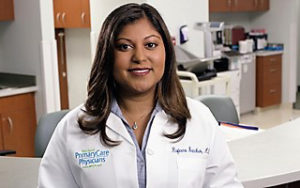Category Archives: Health & Wellness
Making the Most of Your Doctor Visit
A Q&A with Rafeena Bacchus, M.D.
Most of the time, your primary care physician is your first contact for health care. When you make an appointment, knowing how to prepare and what to expect will help you get the most out of your visit.
Q: What kind of appointments can I get at MPCP?
A: We offer two types of appointments:
- A problem visit addresses a new problem or revisits an old one.
- A physical examination is a preventative visit to review your history, examine your body from head to toe, check appropriate blood work (like blood sugar and cholesterol), administer age-appropriate immunizations, and offer age-appropriate screening referrals (like mammograms and colonoscopies).
Making the right kind of appointment will ensure that your doctor can effectively address your health needs.
Q: Can I do anything to get ready for my appointment?
A: There are several steps you can take ahead of time to make sure your appointment runs smoothly:
- Be very clear about what you need when you make your appointment. This allows your doctor to properly prepare for your visit. For example, if you have abdominal pain, your provider can offer you a drape so you can undress from the waist down for an exam.
- Know what referrals you need.
- Take a few minutes to write down notes and questions to make sure all of your concerns get addressed.
- If your provider asked you to monitor your blood sugar or blood pressure, remember to bring those logs in with you.
- If you want to discuss tests ordered by a provider outside of MPCP, don’t assume that we have received these records, even if you asked for them to be sent. Track them down and bring them with you. If you need help tracking down records, call your provider’s assistant a day or two prior to your appointment to alert MPCP to this request.
Asking for copies of test results when you are seen elsewhere is always a good idea. It facilitates your bringing them to your provider for discussion and helps eliminate duplicate testing. Feel free to ask for the records and test results – they belong to you.
Q: When should I arrive for my MPCP appointment?
A: Come 10-15 minutes early to complete paperwork, use the bathroom and gather your thoughts. Turn off your cellphone. This will ensure your entire appointment is used for face-to-face time with your doctor.
Q: How long will my appointment last?
A: Appointment lengths vary from 10 minutes for simple problems to 30 minutes for physical examinations or complex problems.
While your provider would like to be able to address every concern you have, this may not be possible due to time limits. You may need more than one visit or visit type to address all of your concerns.
Q: Sometimes my visit is delayed. Why is that?
A. The most common reasons your doctor might be running late for your appointment are patient tardiness, complicated problems and emergencies. Feel free to ask the check-in staff if your provider is running on time.
Q. What does my doctor need to know about my medications?
A: Your doctor will need to know 1) what medications you take, 2) why you take them, 3) the dose for each one, and 4) how often you take them. We encourage all patients to create a list of all medications, supplements, and vitamins you take. Include any drugs a specialist or urgent care center added to your regimen. Some patients bring the actual pill bottles to avoid confusion.
Your doctor can print a list at checkout of all the active medications we are aware of you taking. Once your provider has a full picture of what you take, they can help you avoid drug-drug interactions or be alert to medication-induced illness.
Q. Is it okay to ask questions?
A. It’s your doctor’s job to make sure you understand and follow through on care, so don’t be afraid to ask questions.
If you don’t understand what your doctor tells you, say so. Repeat back what you hear to confirm you have it right. Take notes. If you still aren’t clear after you leave the appointment, call back and ask for clarification.
Q: What health records should I keep?
A. It’s a good idea to keep a folder with copies of these health records:
- Recent test results
- Your current medication list
- Your insurer’s list of covered medications
- A list of your providers with contact information
- Pending referrals
- Lists of your questions
- Blood sugar or blood pressure diaries
- Vaccine dates
Take notes at your office visits to help you remember important points about your care, and keep them in your folder so you can review them when necessary. Bring your folder on any visit to a healthcare provider, an urgent care center or hospital to help reduce gaps in your care.
Q: What happens after my appointment?
A: MPCP uses its online Patient Portal to communicate test results, or you doctor may call you. But if you don’t get test results in a timely fashion, be sure to ask for them.
Take prescribed medication as directed, and talk to your provider if you have side effects and need to make adjustments. If your doctor schedules a follow-up appointment, be sure to keep it so your doctor can check on your progress and make any needed changes to your care.
 Dr. Rafeena Bacchus sees patients at MPCP’s Columbia office. She received her medical degree from SUNY at the Buffalo School of Medicine and completed her residency program in Internal Medicine at the University of Maryland. She is certified by the American Board of Internal Medicine.
Dr. Rafeena Bacchus sees patients at MPCP’s Columbia office. She received her medical degree from SUNY at the Buffalo School of Medicine and completed her residency program in Internal Medicine at the University of Maryland. She is certified by the American Board of Internal Medicine.
5 Ways to Improve Your Health Now
The secret to good health is really no secret. In most cases, health is the result of lifestyle choices we make, the things we do or don’t do. In other words, good health is in your hands.
Many serious diseases are largely preventable, including heart disease, type 2 diabetes, stroke and several forms of cancer. A recent study found that adults who followed four tenets of good health ─ they controlled their weight, exercised, ate a healthy diet and didn’t smoke ─ were 80% less likely to develop chronic illnesses such as type 2 diabetes, cancer and heart disease.
Whether you’re in pretty good shape or already have health concerns, you can make lifestyle changes to prevent disease and even reverse its effects. Here are five things you can do to take charge of your health.
- Get More Exercise
Exercise is key for preventing illness and maintaining good health. And you don’t have to join the gym. Something as simple as taking a brisk walk 30 minutes a day can dramatically reduce your risk of heart disease, diabetes and several cancers. Also, the feel-good hormones (endorphins) your body produces during exercise are a great way to de-stress and give your mood a boost. The Mayo Clinic recommends at least 150 minutes of moderate aerobic activity or 75 minutes of vigorous aerobic activity a week. - Lose Weight
Studies show that losing just a few pounds if you’re overweight will improve your health. Key to weight loss is a healthy diet that includes abundant fruits, vegetables, and whole grains, and limits refined sugars and unsaturated fats. You should also replace sugary beverages with water; they have a ton of calories. - Get Your Shots and Screenings
Keeping up to date on vaccinations – including your annual flu shot ─ can prevent many dangerous illnesses. Routine health screenings are also a lifesaver. Knowing and managing your cholesterol and blood pressure is crucial to reducing your risk of heart disease, and cancer screening tests can catch some cancers early when they are highly treatable. - Don’t Smoke
You’d think we wouldn’t have to say it anymore, but lung cancer caused by smoking remains the leading cause of cancer death and is also a big factor in heart disease. But thanks to a variety of new nicotine replacement therapies and medications, quitting is easier than ever. - Enjoy Family and Friends
Good social connections not only give you pleasure, they also influence your long-term health. Studies have shown that people who have satisfying relationships with family, friends and their community are happier, have fewer health problems, and live longer. So feel better by hanging out with the people you like most.
Your doctor can provide valuable advice and support as you make important lifestyle changes. But remember, the choice to be healthier starts with you.
 Dr. John A. Billon sees patients in MPCP’s Arnold office. He received his medical degree from Jefferson Medical School and completed his residency program in Family Practice at Stamford St. Peters University Hospital and Robert Wood Johnson. He is certified by the American Board of Family Practice.
Dr. John A. Billon sees patients in MPCP’s Arnold office. He received his medical degree from Jefferson Medical School and completed his residency program in Family Practice at Stamford St. Peters University Hospital and Robert Wood Johnson. He is certified by the American Board of Family Practice.
Stress: You Don’t Have to Live With It
Have you ever found yourself with sweaty hands before a big meeting or felt your heart pound before getting on a roller coaster? You are experiencing stress.
Stress is an automatic response our bodies have to unexpected or challenging circumstances. Your nervous system kicks into high gear, flooding your body with hormones that elevate your heart rate, increase your blood pressure, boost your energy and prepare you to deal with the problem.
Stress is often useful for helping us to focus on a task and perform at a higher level. But the constant pressures of life ─ such as working long hours, traffic jams, money problems and tensions at home ─ can cause your body’s alarm system to stick in the “on” position. This is chronic stress. Over time, it can interfere with your ability to live a normal life and can contribute to serious health issues, including obesity, heart disease, diabetes, depression, gastrointestinal problems and asthma.
Recognize the symptoms of stress
How do you know when daily stress has become chronic stress? Look for these symptoms:
- You become easily upset, frustrated and moody; feel overwhelmed, like you are losing control; have difficulty relaxing and quieting your mind; feel lonely, worthless, and depressed; and avoid others.
- You have low energy, headaches, upset stomach (including diarrhea, constipation and nausea), chest pain and rapid heartbeat, tense muscles, insomnia, frequent colds and infections, loss of sexual desire and/or ability, nervousness and shaking, cold or sweaty hands and feet, clenched jaw and grinding teeth.
- You experience constant worrying, racing thoughts, forgetfulness and disorganization, inability to focus, being pessimistic or stuck in negative thoughts.
How stressed are you? Take this quick test to find out.
Take steps to de-stress
Even if you are experiencing high levels of stress, you don’t have to stay that way. You can choose to make changes in your life and learn techniques to feel better now and lower the possibility of stress-related health issues in the future.
- Breathe deeply. Just a few minutes of deep breathing can calm you and tame your physical response to stress. You can do it anywhere, such as at your desk or in a parked car. As you breathe out, relax a specific muscle group. Start with the muscles in your jaw. On the next breath out, relax your shoulders. Move through the different areas of your body until you’re feeling calm.
- Focus on the moment. When you’re stressed, you’re probably worried about what to do next or regretful about something you’ve already done. Distract yourself from worry by focusing on what you’re doing right now. If you’re walking, feel the sensation of your legs moving. If you’re eating, focus on the taste and the sensation of the food. Practice being in the moment.
- Keep your problems in perspective. We get stressed when we focus so much on a specific problem that we lose perspective. You need to remind yourself of the ways in which you’re lucky — that you have family and friends, that you have a job and good health. Counting your blessings helps you put your problems back into perspective.
- Identify what’s stressing you. If you feel stressed, write down the cause, your thoughts and your mood. Once you know what’s bothering you, develop a plan for addressing it. That might mean setting more reasonable expectations for you and others or asking for help with household responsibilities, job assignments or other tasks.
- Build strong relationships. Relationships can serve as stress buffers. Reach out to family members or close friends and let them know you’re having a tough time. They may be able to offer practical assistance and support, useful ideas or just a fresh perspective as you begin to tackle whatever’s causing your stress.
- Get enough rest. 7-8 hours of sleep each night is a powerful antidote for stress. Try cutting back on caffeine and alcohol, remove distractions such as television or computers from your bedroom, and go to bed at the same time each night.
- Learn relaxation techniques. Meditation or yoga helps with stress management. Getting good at them will take a little time and practice, but the long-term result is an improved mood and better health.
- Get active. Regular exercise is key to long-term stress management. People who exercise tend to have better moods and more energy than people who don’t. Regular exercise will also lower your risk for many health problems.
Doing these things will help calm you down and lift you up. But if you continue to feel stressed, talk to your doctor. Your doctor can help you learn how to manage stress effectively or, if needed, refer you for additional care.
 Dr. Sneha Sheth sees patients in MPCP’s Arundel Mills office. She received her medical degree from St. George`s University, School of Medicine, and completed her residency program in Family Medicine at Robert Wood Johnson Medical Center. She is certified by the American Board of Family Medicine.
Dr. Sneha Sheth sees patients in MPCP’s Arundel Mills office. She received her medical degree from St. George`s University, School of Medicine, and completed her residency program in Family Medicine at Robert Wood Johnson Medical Center. She is certified by the American Board of Family Medicine.
Health Effects of Live Music Go Beyond ‘Feeling Good’
A Q&A by Daniel J. Konick, M.D.
Q: Listening to music can make you feel good. What else is there to know?
A: For the first time, a study has demonstrated that live music can produce beneficial physical effects in listeners ─ it reduces the level of the hormone that causes stress.
Q: How was this discovered?
A: Investigators from the Centre for Performance Science in London used volunteers attending concerts featuring the music of composer Eric Whitacre. Over the course of two concerts, the researchers took saliva samples from the participants before the performance and then during intermission. Laboratory testing found significant reductions in the hormone cortisol.
Cortisol is called the “stress hormone.” When the body is under duress, cortisol spikes. It prepares the fight-or-flight reaction by raising sugar levels in the blood. These activities are designed to keep you safe and ready for action. However, if cortisol levels remain high for long periods, the resulting stress can be physically dangerous.
Q: Why is this research important?
A: Ongoing high levels of stress can lead to serious health issues, such as high blood pressure, heart disease, obesity and diabetes ─ not to mention making you feel bad. The research found that live music reduces cortisol levels, so it follows that live music can reduce stress and contribute to relaxation and a feeling of well-being.
Q: What can we take away from this study?
A: Go to a concert. Enjoy the music and the health benefits of relaxation. Just one thing: if you’re going to hear loud music, make sure you wear ear protection. Your ears are important too.
 Dr. Daniel J. Konick is an MPCP partner and is certified by the American Board of Internal Medicine. He sees patients in the Queenstown office. He is also part of a musical family: he plays piano and clarinet, his wife plays violin, his older son teaches music and voice and plays piano and violin, and his younger son is studying for his Masters in Music Composition and plays multiple percussion instruments, including the marimba and hammered dulcimer.
Dr. Daniel J. Konick is an MPCP partner and is certified by the American Board of Internal Medicine. He sees patients in the Queenstown office. He is also part of a musical family: he plays piano and clarinet, his wife plays violin, his older son teaches music and voice and plays piano and violin, and his younger son is studying for his Masters in Music Composition and plays multiple percussion instruments, including the marimba and hammered dulcimer.



